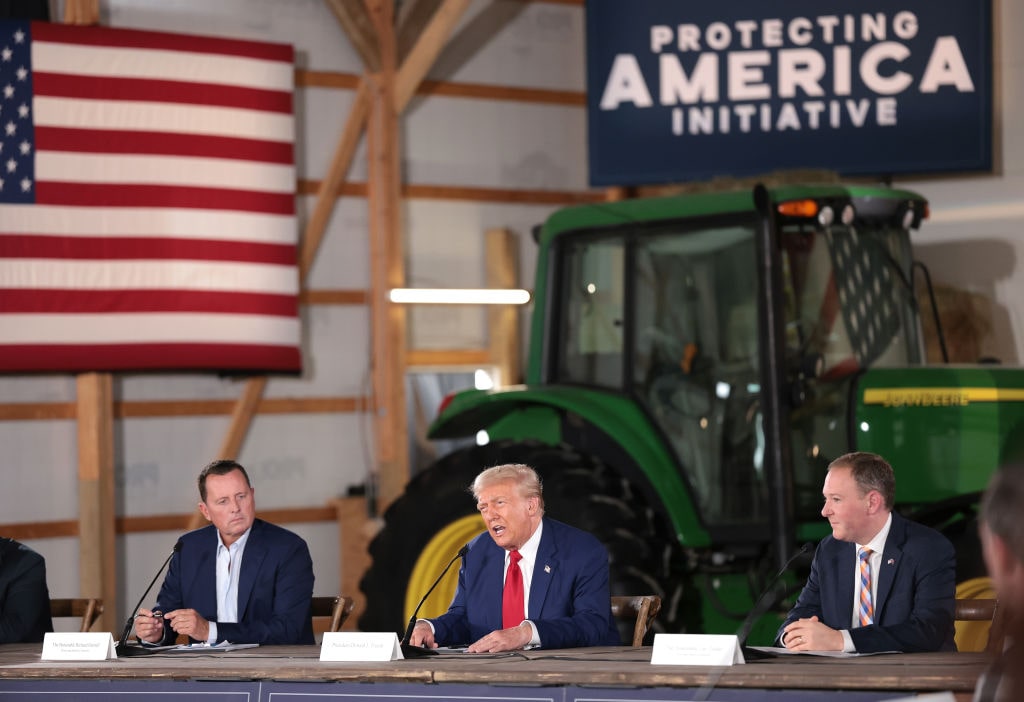Former President Donald Trump hit the campaign trail in Pennsylvania yesterday (Sept. 23), speaking to a forum of farmers in the all-important swing state. With John Deere tractors framing the background, he made it very clear that he doesn’t support companies moving any part of their business out of the country, and if they do, he’ll impose a hefty tariff should he regain the Oval Office.
Trump Promises 200% Tariffs
John Deere recently announced plans to move some production of its tractors, such as cab assembly, to Mexico, which resulted in layoffs at Iowa facilities. “I’m just notifying John Deere right now,” Trump said. “If you do that, we’re putting a 200% tariff on everything that you want to sell into the United States.” He added, “It’s hurting our farmers It’s hurting our manufacturing.” The presidential candidate’s announcement had an immediate impact on the stock market as shares of Deere dropped 1.7% in after-hours trading.
The tractor company wasn’t the only one put on notice. Trump also sent a message to automakers with factories in Mexico. “We’re going to put big tariffs on those cars that are coming in here at 100% to 200%, and they’re no longer going to be competitive, so you better stay in Michigan.”
Responding to a statement by one farmer regarding Chinese subsidies, Trump said, “That’s why we need tariffs.” China held nearly 250,000 acres of US land at the end of 2022, according to the US Department of Agriculture. After a Chinese billionaire was able to buy more than 130,000 acres near an Air Force base in Texas, and another company tried to build a corn plant near an Air Force base in North Dakota, 24 states either banned or limited foreigners from owning certain types of private land.
A Steel Town Pitch
Staying with the topic of keeping manufacturing at home, Trump spoke on the proposed acquisition of US Steel by Japan’s Nippon Steel. “We are also going to keep US steel right here in the United States,” he vowed. “We have to be strong and powerful together. We must put tariffs on foreign predators – they are predators – so that they don’t destroy our steel industry.” His message got a little more personal, saying:
“We must keep our steel companies. And we must keep making steel. If we have a war, are we going to go, ‘Gee, China, can you send us some steel, please?’ Oh, forget about that. If we have a war, think of it: if we need it for our military, how do we build our tanks? How do we build our ships? We wouldn’t have any steel. We have to make US Steel great again.”
Voter Outreach
The former president wasn’t all tariff talk, though. He also called out to Christians and gun owners, saying they needed to vote. “They go to church. They love church and that’s great. Christians, Evangelicals, we have to get them out to vote. We have to get gun owners… If we have Christians voting in full strength, we couldn’t lose. We have to get gun owners because your guns are under siege.”
Mr. Trump claimed if he had been elected in 2020, the Russia-Ukraine war wouldn’t have happened, and if he’s elected this year, he’s going to put an end to it. “As president-elect, if I win this election, the first thing I’m going to do is call up [Ukraine President Volodymyr] Zelensky and call up [Russian] President Putin and I’m going to say, ‘You gotta make a deal.’”
Trump hit on several other hot-button issues such as immigration and the economy. He also had a message about his adversary, Kamala Harris. “She’s a one-woman economic wrecking ball and if she gets four more years, her radical agenda will smash the economy into rubble and grind your financial situation right into the dust,” he said. “She wants to take your guns away. She’s coming for your money. She’s coming for your pensions, and she’s coming for your savings.”
From iconic companies to the backbone of American industry, the former president made the case for his re-election to possibly the most significant state in the union (in Electoral College terms). It was a targeted sales pitch that almost certainly hit home with an audience that has long been under pressure. As both major party candidates spend an outsized portion of their time and treasure on Pennsylvania, it will likely be the messaging that makes the ultimate difference.




